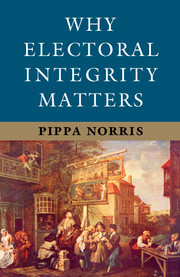Book contents
- Frontmatter
- Contents
- List of Figures
- List of Tables
- Preface and Acknowledgments
- Part I Introduction
- Part II The Problem of Flawed Elections
- Part III The Consequences of Electoral Integrity
- 6 For Legitimacy
- 7 For Political Behavior
- 8 For Conflict and Security
- 9 For Regimes
- Part IV Conclusions
- Technical Appendix A: Description of Variables and Scale Construction
- Technical Appendix B: Questions in the Expert Survey of Perceptions of Electoral Integrity
- Technical Appendix C: Electoral Context and Background in the Selected Cases
- Notes
- Select Bibliography
- Index
9 - For Regimes
Published online by Cambridge University Press: 05 July 2014
- Frontmatter
- Contents
- List of Figures
- List of Tables
- Preface and Acknowledgments
- Part I Introduction
- Part II The Problem of Flawed Elections
- Part III The Consequences of Electoral Integrity
- 6 For Legitimacy
- 7 For Political Behavior
- 8 For Conflict and Security
- 9 For Regimes
- Part IV Conclusions
- Technical Appendix A: Description of Variables and Scale Construction
- Technical Appendix B: Questions in the Expert Survey of Perceptions of Electoral Integrity
- Technical Appendix C: Electoral Context and Background in the Selected Cases
- Notes
- Select Bibliography
- Index
Summary
How do regimes respond to failures of electoral integrity – especially when public concern and disaffection rises about flawed or failed contests? This chapter sets out the theoretical argument addressing this complex issue, suggesting that public discontent with electoral malpractices can lead to several possible scenarios: the response may be one of institutional stasis (no fundamental change to the status quo, if discontent quickly fades, incumbent veto players resist change, and other problems predominate on the policy agenda), reform concessions (and thus pro-democratic institutional change, especially where governing elites and parliamentary parties are divided, and a coalition mobilizes public support for change), state repression (and further crackdown on public dissent), or regime transitions (replacing the ancient regime, fueled by popular uprisings from below and opposition mobilization). Predicting each of these scenarios remains a difficult puzzle where key pieces of the jigsaw are often missing from the box. Rational choice models provide some analytical clarity while case studies provide further insights, although revealing far messier and more complex underlying processes than parsimonious theoretical models suggest. Our partial and incomplete understanding of this process, more than most parts of this book, remains a work in progress.
- Type
- Chapter
- Information
- Why Electoral Integrity Matters , pp. 169 - 188Publisher: Cambridge University PressPrint publication year: 2014



